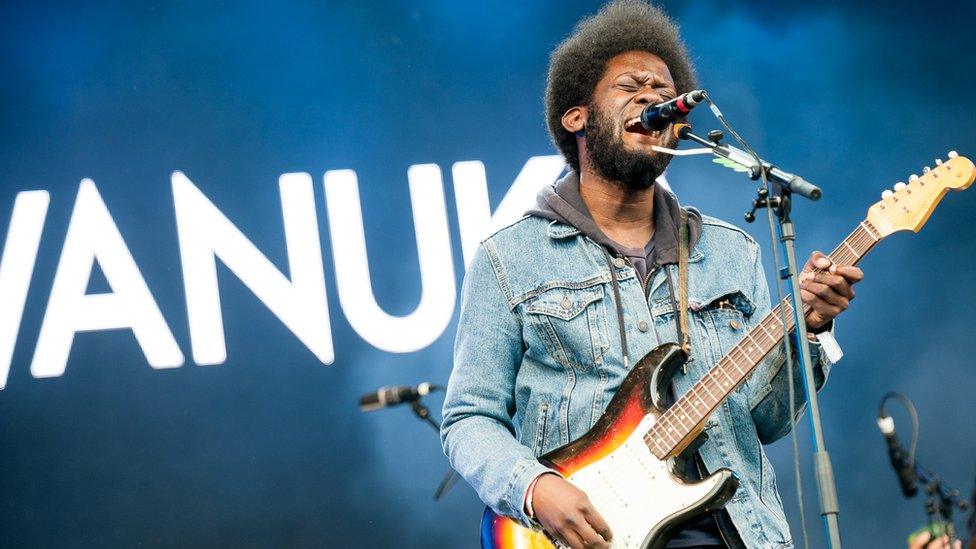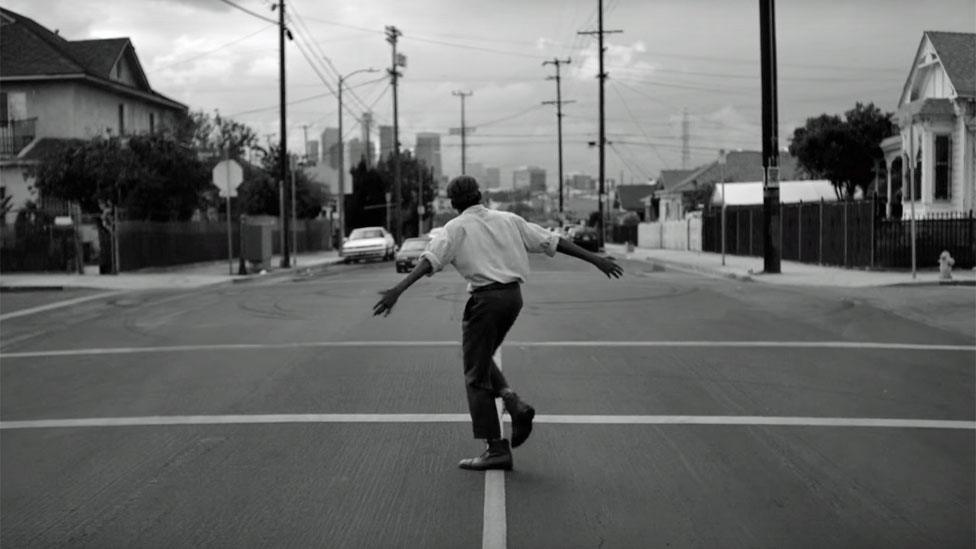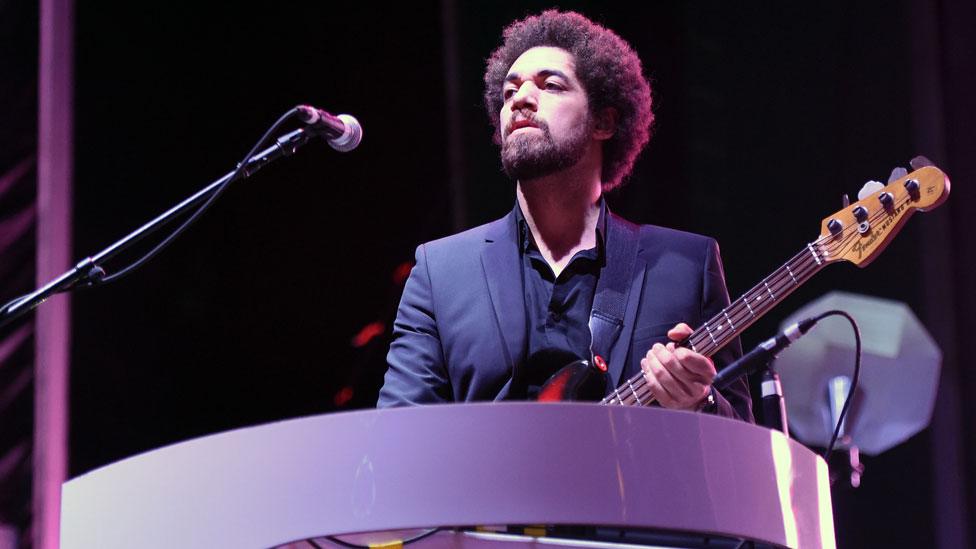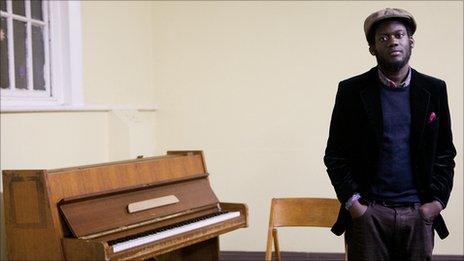Michael Kiwanuka: 'Sitting down to write a song wasn't fun'
- Published

Kiwanuka played new material at Glastonbury in June
"The idea of sitting down to write a song wasn't fun anymore I always thought it wasn't good enough."
It is a brutal admission from Michael Kiwanuka, the winner of the BBC's Sound of 2012.
The 29-year-old singer-songwriter from Muswell Hill in north-London is talking about a time between his debut album and its hectic touring schedule, which saw him play dates to audiences across the world and the forthcoming release of his second album, Love And Hate.
His soft, tender vocals and acoustic guitar endeared him to fans of pop and folk music, and there were also flashes of jazz and comparisons to classic artists like Bill Withers and Otis Reading. But the sound eventually grew restrictive and led, not to a bout of creative block, but rather a complete crisis of self-confidence.
"There was a lot of doubt between the first album and this album. When I went into the studio and it affected my inspiration, my songwriting.
"I'm still really proud of that first album, I still really love that music, I guess it was more like how can you keep people interested in your music and what you're doing and how do you stay relevant without sacrificing who you are or being inauthentic to yourself?
"I tried to make the album and scrapped a lot of songs and started again which is one of reasons why it took so long to do."
Borne out of this frustration came the song Black Man In A White World - which would become the first single from Kiwanuka's new album.

Black man In A White World was Radio 1 DJ Annie Mac's Hottest Record
"I didn't intend it as a first single," he says. "Making this album was a massive learning curve, every album probably is but it was a massive learning curve about me being me and gaining confidence to really believe that I could be an artist."
The reaction to the record was overwhelming positive. Radio 1's Annie Mac made it the week's Hottest Record.
"It was the first that changed everything," says Kiwanuka. "It gave me a fresh approach, I saw myself in a different space. I was sitting in the studio trying desperately to come up with something interesting and kept hitting a brick wall and that hook and those lyrics came out. Kind of out of frustration but not politically, like I was frustrated about what was happening out in the world. It was the frustration leading up to why all this self-doubt was there."
Nevertheless, the song has been given extra currency by a range of issues including the rise of the #Blacklivesmatter campaign in the US.
"I would meet musicians who were so self-confident in what they were doing, like I couldn't even put a track on and play a demo to people, I just thought they were awful but then I'd see people who were so confident in what they did. I was like 'I want some of that', so that's why that came out - 'I'm a black man in a white world', me not fitting in when I was growing up is the reason maybe why I'm so shy about everything and when that started to sound good, it was like 'I get it', the inspiration came.
"So it wasn't like to do something political, I didn't think it would be the first single because I saw it as just an exercise and when it was done, I thought no-one's going to play that because of the lyrics. It wasn't the intention to do something political but it came from digging deeper within myself."
Much of that burst of newly-discovered creativity was thanks to the producer on the new album, a Mr Brian Burton, better known as Danger Mouse.
"I've been a fan of his for ages, we had met before and we didn't have any plans to work together, so when he said we should, I thought, 'Amazing'.
"I definitely wanted his sensibilities to help push my music forward. I want to sing on things that sound good turned up, that have a heavier weight. His records sound classic but are also modern sounding."

Danger Mouse has produced the latest Red Hot Chili Peppers album
Burton had asked Kiwanuka about what he wanted people to hear in his music and why someone should download and stream one of his song but also what he could do to subvert what people had come to expect from a Michael Kiwanuka song.
"He said he'd be interested to hear what I sound like angry, for example, and when he discovered I could play the guitar, he thought that's the way to do it, to contrast with my smooth sounding voice."
"I was using the same processes as I did on the first album and I thought it was a tired road for me, it was growing a bit repetitive and a bit tiring so I asked myself how can I get some excitement in my music without being crass. Getting out of the country, thinking about orchestrations, about new things to sing about, putting the acoustic guitar down freed me up and made music sound different."
One of Kiwanuka's heroes, Prince, died earlier this year. He famously recorded everything he did, much of which is still unreleased in his legendary "vault" of music. Kiwanuka admits he would like to go back to some of those songs which cause him so much heartache.
"I hope so, I'd like to think so. You need to have your own working space because something that happens is, someone you work with says, 'Oh I don't like that song,' so you put it down and you work on something else. If you have your own space, you can at least get them to a point where they're presentable and then you can decide, so I hope some of those songs will come out.
"I think some of them were good, they just weren't given the light of day to show their full potential so I'll probably revisit those, there are loads that have not been released."
Love And Hate is due out on 15 July.

Follow us on Twitter @BBCNewsEnts, external, on Instagram at bbcnewsents, external, or email entertainment.news@bbc.co.uk, external.
- Published16 June 2011
